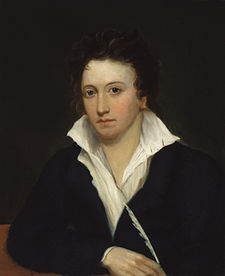Percy Bysshe Shelly
| Percy Bysshe Shelley | |
|---|---|

Portrait of Shelley, by Alfred Clint (1819)
|
|
| Born |
4 August 1792 Horsham, Sussex, England |
| Died | 8 July 1822 (aged 29) Gulf of La Spezia, Kingdom of Sardinia (now Italy) |
| Occupation | Poet, dramatist, essayist, novelist |
| Alma mater | University College, Oxford |
| Literary movement | Romanticism |
| Spouse | Harriet Westbrook (m. 1811-1816; her death) Mary Shelley (m. 1816–1822; his death) |
|
|
|
| Signature | |
Percy Bysshe Shelley (![]() i/ˈpɜːrsi ˈbɪʃ ˈʃɛli/; 4 August 1792 – 8 July 1822) was one of the major English Romantic poets, and is regarded by some as among the finest lyric poets in the English language, and one of the most influential. A radical in his poetry as well as in his political and social views, Shelley did not see fame during his lifetime, but recognition for his poetry grew steadily following his death. Shelley was a key member of a close circle of visionary poets and writers that included Lord Byron, Leigh Hunt, Thomas Love Peacock, and his own second wife, Mary Shelley, the author of Frankenstein.
i/ˈpɜːrsi ˈbɪʃ ˈʃɛli/; 4 August 1792 – 8 July 1822) was one of the major English Romantic poets, and is regarded by some as among the finest lyric poets in the English language, and one of the most influential. A radical in his poetry as well as in his political and social views, Shelley did not see fame during his lifetime, but recognition for his poetry grew steadily following his death. Shelley was a key member of a close circle of visionary poets and writers that included Lord Byron, Leigh Hunt, Thomas Love Peacock, and his own second wife, Mary Shelley, the author of Frankenstein.
Shelley is perhaps best known for such classic poems as Ozymandias, Ode to the West Wind, To a Skylark, Music, When Soft Voices Die, The Cloud and The Masque of Anarchy. His other major works include a groundbreaking verse drama The Cenci (1819) and long, visionary poems such as Queen Mab (later reworked as The Daemon of the World), Alastor, The Revolt of Islam, Adonaïs, Prometheus Unbound (1820)—widely considered to be his masterpiece—Hellas: A Lyrical Drama (1821), and his final, unfinished work, The Triumph of Life (1822).
...
Wikipedia
